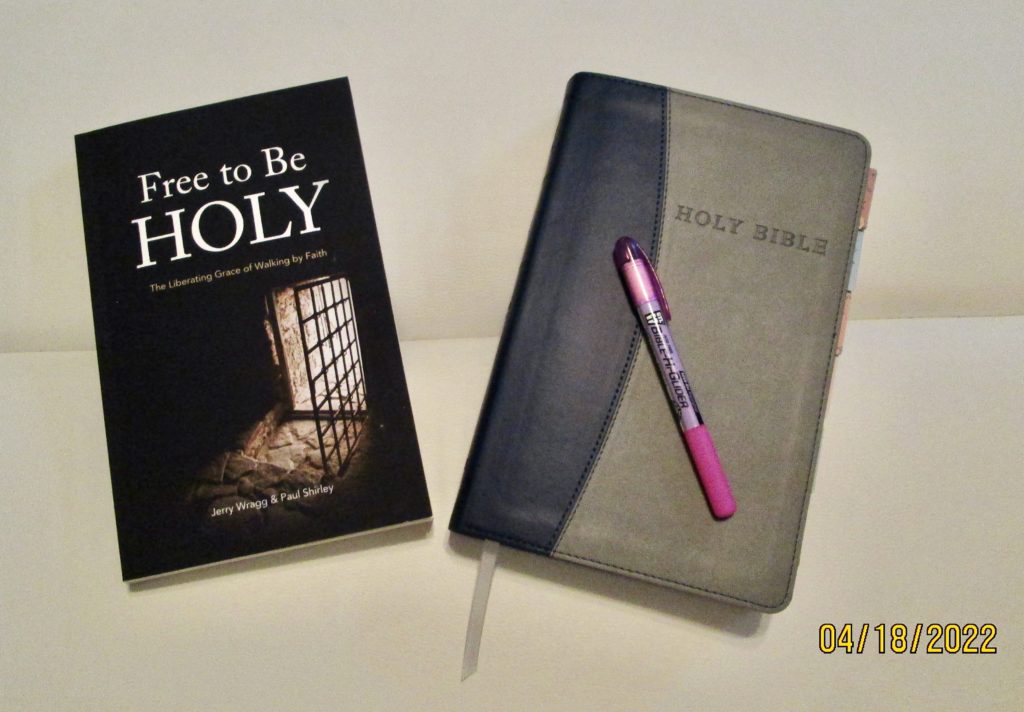
As I conclude this series, we will take a small peek at the information in the final part of the book, Free to Be HOLY The Liberating Grace of Walking by Faith, by Jerry Wragg & Paul Shirley. I would like to encourage you to buy the book and do your own personal Bible study with it. You will find help to walk out a maturing life in Christ.
In the other posts about this book, we looked at obeying the law (commandments) versus living by grace. We recognize our inability to follow all the commandments as we should. The authors say, “Discouragement for failing to meet the Law’s demands is exactly what God intended His Law to produce.” (p. 92)
“When God gave the Law to Israel under the Old Covenant, it was a gracious ministry to His people in several ways:
- … its arrival in Israel exposed just how dark and dead our corruption is (Rom. 7:13)
- It revealed sin’s aggressive, enslaving nature (Rom 7:8-13)….
- It was given as a custodian/teacher to bring its subjects to the end of themselves that they might see their need for a Savior (Gal 3:24).
- It restrained outward anarchy to protect the moral, social, and religious institutions of Israel.
- It hemmed the nation in with promises of blessings and cursings to keep them from running violently away from its unbending standard (Lev 26; Deut 28).” (p.93)
“So long as the spiritual principles in the Law have not changed, then these five ministries of the Law still apply in some way to every believer, Old and New Covenants.” (p. 93)
“We are no longer held accountable to keep the whole Law (which of course we have no moral capability of doing), and therefore are no longer condemned by failing to do so. But on the other hand, in Christ we now love the law of God, expressed in His commands which reflect His eternal moral perfections—His majestic holiness.” (p.96)
If we are where we need to be in Christ, we have a deep desire to keep the Laws. In 1 John 2:4-5 the scriptures tell us why—
4 He that saith, I know him, and keepeth not his commandments, is a liar, and the truth is not in him.
5 But whoso keepeth his word, in him verily is the love of God perfected: hereby know we that we are in him.
These verses show us that following God’s commands teaches us how to love others as we should. And, we know we are truly saved and going to heaven, when we commit ourselves to searching the scriptures for how we should live, standing true to God’s commands.
Personal Bible study and prayer are the most important things you do as a Christian. The authors say, “It is impossible to be sanctified without understanding biblical truth, but it is possible to understand biblical truth without being sanctified by it…. For truth to be sanctifying, the Holy Spirit must be at work illuminating and applying it…. The Word of God is so connected to the ministry of the Spirit that obedience to Scripture is submission to the Spirit…. Studying the Word while never entrusting yourself to its truth and power feeds pride and leads to spiritual blindness (1 Cor 8:1)…. a person cannot submit to what he does not understand.” (pp.145-146)
J. C. Ryle says, “How a man can live and not breathe is past my comprehensions and how a man can believe and not pray is past my comprehension too.” (p.148)
“…Hebrews 4:16 refers to prayer as approaching ‘the throne of grace’ so we can ‘find grace.’ It is a gift of grace that we are permitted to pray and through prayer we are provided with more grace.” (p. 148)
“…when you practice daily prayer you are setting aside time each day to declare your dependence upon God.” (p.149)
The final part that I want to mention is a great resource for the believer and found on pages 165-166. It is titled “Spiritual Triage”.
This section gives a question and a scripture to ask yourself when sin is persisting in your life and you need to have your heart penetrated to get rid of it.
Just to give you a tiny taste of the questions, here are three out of ten total:
- Do I gravitate toward remedies that put my sin in a more positive light and require no true brokenness (Matt. 5:3)?
- Do I tend to want a relieved conscience rather than a cleansed one through repentance and forsaking sin (Prov 28:13)?
- Am I trying to shift blame for my sin, putting the primary culpability on someone or something else (Gen 3:12)? (p. 165)
The authors tell us, “Questions like these leave us with no excuses. They hem us in and demand that we measure our spiritual condition by Scripture rather than our subjective assumptions.” (p. 166)
I want to encourage you once more to buy the book. Find the spiritual triage page and answer all the questions. Share it with others. Hebrews 3:13 says, “But exhort one another daily, while it is called Today; lest any of you be hardened through the deceitfulness of sin.” And Hebrews 12:14 says, “Follow peace with all men, and holiness, without which no man shall see the Lord.”
Have you read any books or Bible studies of a similar nature to, Free to Be Holy? If so could you share them with us in the comments?

Thanks Jane. Great review.
Thanks for the comment, Tim:)
Thanks for such a thorough review. And the reminder to consistently and constantly seek God and study His Word.
You’re Welcome! Thanks for all your support:)